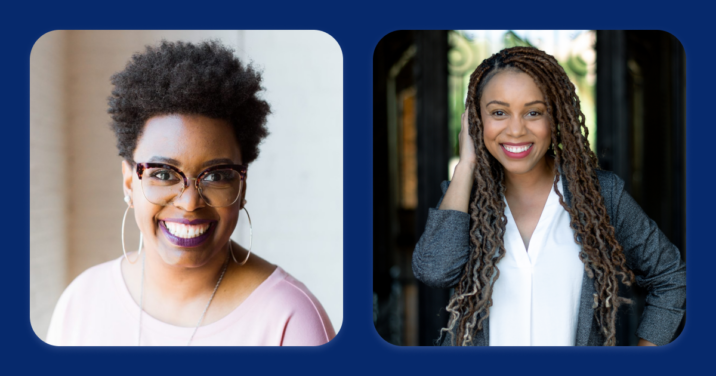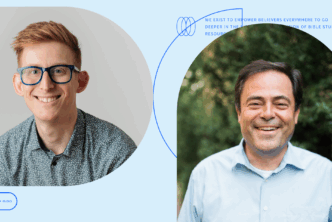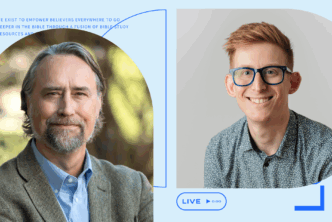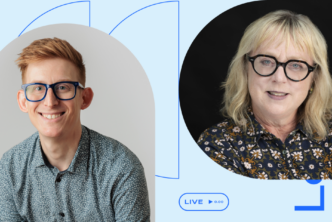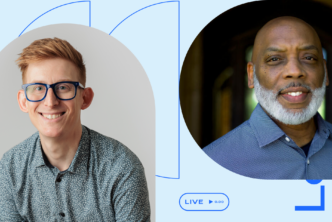What you’ll see in this Logos Live episode
Jennifer Lucy Tyler interviews Bible teacher and author Elizabeth Woodson about her soon-to-be-released book From Beginning to Forever. Tune in to hear about Woodson’s life and ministry as well as insights on the narrative of Scripture.
Elizabeth Woodson is a Bible teacher and author who is passionate about equipping believers to understand the rich theological truths of Scripture. She loves helping people internalize their faith and connect it practically to everyday life. She is author of Embrace Your Life as well as contributing author for World on Fire: Walking in the Wisdom of Christ When Everyone’s Fighting About Everything and a graduate of Dallas Theological Seminary with a Masters in Christian Education.
To catch all of our Logos Lives, follow us on Facebook or Twitter or subscribe on YouTube.
Interview transcript
This transcript has been lightly edited for readability.
Jennifer Lucy Tyler:
Well, hello and welcome to another Logos Live. My name is Jennifer Lucy Tyler. I am a national presenter at Logos Bible Software, and I have the distinct privilege to have this conversation with not only is she a theologian, a disciple maker, an author and a Bible teacher, but she’s also my friend. Her name is Elizabeth Woodson. So welcome, Elizabeth.
Elizabeth Woodson:
Thank you, Jennifer. It is great to be here.
Jennifer Lucy Tyler:
It’s so great to have you and to just be having this conversation. We’re just gonna dialogue like how we would normally do, but we’re gonna talk about some theology, some bible literacy, and all the things that we love discussing. But before we get into that, just tell us how has God been at work in your life and tell us a little bit about who you are and your story.
Elizabeth Woodson:
Yeah. I am super thankful because the Lord has definitely had his hand on my life for, I mean, we all know since we were born, but I have seen him at work in just really unique ways. I grew up in a Christian home and so Jesus was just what we did. My parents are wonderful people married for 40 years, and they showed me and modeled me what it meant to follow Jesus. But I still had questions. I had questions for myself as a kid. I came to faith with the puppet show at a VBS program. I tell people it worked. Wow. Yeah. And it took me a while though to really make the connection between why the gospel was important in my everyday life. One, I was just a kid. And two, it took the Lord taking me through or me going through some hard seasons. I always talk about how I learn by the concrete method: I fall down the concrete, bust my head and realize that is not the way to go. Yeah, that’s me particularly through college. I just realize, man, the things I’m going through, Jesus is the answer for that. That the people or habits that I have formed are not gonna solve my problems and I keep coming back to them. And it is a gospel that truly saves and frees us. And it was in that moment that I think the Lord really just captured my heart for not only understanding the gospel, but man, how do I help other people understand it as well? And so my background is in business. I loved doing accounting for a decade plus, went to school for it. It Was just a unique experience. After college, the Lord took me from accounting into ministry. And so 2010, I quit my job, sold my stuff, and stepped out on faith to attend Dallas Theological Seminary. And I haven’t looked back since.
Elizabeth Woodson:
I’ve had the opportunity to work on staff at two different churches at two different times. I’ve done singles ministry, I have worked in an institute, in a church. And Christian education. But the link between both of those is discipleship. I want to help people understand the deep things of God, but also make that connection between what we see in Scripture and their everyday lives. And really that’s from my own personal journey, a question that keeps presenting itself is: why does this matter? Why is this important? I know it’s beautiful, I know it’s true, but how does it connect to what I’m experiencing and who I’m becoming? I’ve seen God just open up doors to do that through speaking and writing and discipling people, leading volunteers, leading ministries. And now in a season where I am working for myself to be able to do that with a lot of different churches and a lot of different people in a variety of ways.
Jennifer Lucy Tyler:
Wow, that’s incredible. So there’s many ways that equip the church and that is really what you operate in. Well, let’s talk a little bit about how you are currently being used to equip the church. I know, I know through books and things of that nature, but what are some specific ways today that you are equipping the church?
Elizabeth Woodson:
I think about it in two different categories. That I create resources to help people grow and understand their Christian faith. But I also facilitate training and experiences. And so whether that is me speaking at a conference or retreat or me doing a training for a church that says, “Hey, teach us how to study the Bible. Teach us a little bit about theology. Teach us a little bit about spiritual formation or the story of the Bible.” I’m able to step into those environments and help people go to the next level in their faith. I’m really passionate about that. Everyone has access to be able to understand and grow in their Christian faith, that they have a pathway, they have access to resources, and that those resources are contextualized. the body of Christ is diverse, it’s beautiful, it is global. And that a passion of mine is also to be able to introduce people to resources that have a global footprint and voice because again, there’s much for us to learn from the vastness of the body of Christ. Yeah. But those kind of resources and books and social media, you know, my little post, I try to do something, but then being in front of people and training and speaking is a space I am in as well.
Jennifer Lucy Tyler:
Let me just say I love your social media because one of the things, if you follow Elizabeth on social media, she always shares these list of different people within the body of Christ that we should follow, whose books and resources we should be reading. And it’s so, so helpful. I’ve discovered a lot of different teachers from those lists, so I thank you for that. I was first introduced to your teaching by listening to a video. I think it was on YouTube, something you talked on the grand narrative of scripture. And I know that you currently have a study called From Beginning to Forever on that very topic. How important is it for us to understand the grand narrative of scripture when we’re reading and studying the Bible? Because I have to be honest with you. Growing up in church, that’s something that I never heard spoken about. You know, I learned all of the Bible stories, but just this grand narrative and how everything works together was something that I did not learn. So how important is understanding that in our study and in our reading?
Elizabeth Woodson:
You know, when it comes to the grand narrative of scripture, to me, I think it’s game changing because, you know, we believe in the diversity and uniqueness of each book of the Bible, that they have a unique author, a unique audience, a unique message. But there’s also this belief that all of them fit together. And as we see God reveal himself throughout the text to show us who he is and what he’s doing and what it means to live in his world, it changes how we read Scripture. because we get, in some sense, the big idea. We can get lost in the details. We can interpret scriptures in ways that are relevant for us, but are totally disconnected from the author’s meaning and really miss God in the text. And the metanarrative of Scripture helps us stay on track and really helps us see, and God is doing this thing in history.
Yeah. And he has created us in this environment of shalom, that sin messes that up. And what we see is him redeem his people, work to redeem his people, his faithfulness, his love, his goodness, his kindness, his justice, his righteousness. We see all of this unfold through scripture, and we see it ultimately the promises that he makes through the covenants fulfilled in Jesus Christ. And so, I think as I’m talking to people, one thing that it does is just helps us stay on track. Like we always say, Leviticus may or may not be people’s least favorite book in the Bible. And it, you know, might be where people fall off in their Bible reading plan. And a lot of times it’s because they don’t get it. Like, what’s all this detail I got to do with anything? And scripture helps you realize, and this is showing me God’s holiness, but also what it meant for Israel to be in relationship with God.
Yeah. And, and you see this, God is trying to restore the ability for humanity to be in a relationship with him. We see the heavy price at that cost, and we ultimately see that cost paid by Jesus Christ. But it helps us put it in context. Keep the main thing, the main thing, the focus on God, the focus on Jesus, and really see the beauty of what God is doing through redemption. And to me, it changed my faith, gave me a place to ground my reading and study of Scripture. And so I think if there is one thing that everyone should know, when it comes to Christianity and it comes to our understanding of Scripture, it is the grand narrative because it will help you as you study all the rest of the things.
Jennifer Lucy Tyler:
Yeah, I totally agree. Because it wasn’t until understanding the grand narrative that I looked at Leviticus with new eyes. And now I’m able to read it with an understanding of how it works through the whole, Bible. So let’s talk a little bit about your specific study. How are you going through this grand narrative of Scripture as you’re teaching it? And what could we expect if we are to go through from beginning to forever?
Elizabeth Woodson:
Yeah. So it’s an eight-week study. The first week is an introduction. And the rest of the seven weeks I break up the story of scripture into what I call chapters. These are not divinely inspired chapters, but categories to help us group together. The movement of the story and the connecting point people will see is this idea of kingdom. And so people might come across the kingdom in the words of Jesus. When he says ‘the kingdom is here,’ he tells people to repent. But that idea of kingdom actually shows up for us in the very beginning because this place that God establishes for humanity, and again, we see this interaction of what happens with God’s good and perfect plan and sin. And so we see God working to restore what he created, ultimately in an even better way.
We see this in Revelation. But what I do is I take people through the story and, the link for the kingdom is covenants. So we’ll talk about the Abrahamic Covenant, we’ll talk about, um, Israel and the exodus and the mosaic covenant. We’ll talk about Israel and their monarchy, um, and their leaders and how they struggle to follow God and the stories of faithful believers in the midst of that. And we’ll talk about the Davidic Covenant and the need for a good and perfect king. That’s Jesus. We’ll talk about exile, and judgment, but hope, and so seeing and understanding what happens with the prophets, we’ll talk about Jesus of course. Yes. And then the church. And so we’re the kingdom community. And so what it means for us to live in the kingdom of God now and live as if it’s true because it is and it affects how we show up in the world.
And then one of my favorite parts is to end with what we’re still hoping for, which is the return of Jesus and this perfect shalom and wholeness that we are waiting for. Revelation 21, the moon will no longer light the sky because the glory of God will, God will dwell with his people once again. My goal is 50,000-foot-level to give people the connecting points. We don’t go over everything. We don’t have time for that But it’s about a half hour of teaching. And then there’s weekly homework that goes with the teaching videos as well. And again, the goal is what’s the whole story? Can I tell it in my own words? And then have context for going back to study the individual books of the Bible, it will help you in that effort as well.
Jennifer Lucy Tyler:
Oh, I’m so excited to dive into this study, with my own Bible study group. So thank you for what you do in these resources. Are there specific authors or teachers that you have studied or even specific places of scripture that show how God is working in this grand narrative that you, you can share?
Elizabeth Woodson:
There’s a couple that were really helpful even in my writing of this study. One is Michael Williams, Far As The Curse Is Found. Super great resource. Vaughan Roberts, God’s Big Picture. And so if you’re looking for a super introductory study of someone who maybe has no context, even for a lot of the stories in scripture, that’s a really good one to use. And then Patrick Schreiner wrote one, I have it with me because I wanted to remember the name of it. The Kingdom of God and the Glory of the Cross.
Jennifer Lucy Tyler:
Can I see it?
Elizabeth Woodson:
Yeah, little tiny books. Crossway published it. And they have a series of books that are in this group of books in this series. But this is a great one to get your head around. Okay. This idea of Kingdom, like how does it show up throughout the entirety of scripture? There are some larger ones that I use as well, but I think the smaller ones can be helpful for an introductory resources.
Jennifer Lucy Tyler:
Awesome. Well, I know that the grand narrative is not the only thing that you teach on. You’re very passionate about Bible literacy over all. So maybe can—let’s just talk about why Bible literacy is so important. I think we’re hearing a lot about it now in some spaces in the church, but we don’t hear about it in other spaces. And so why is this important? Why is Bible literacy important?
Elizabeth Woodson:
Yeah. You know, as Christians, we are people who believe certain things about what it means to be human, about what it means to live in this world. About what our goals are, where identity and purpose comes from, and ultimately who God is, and how we relate to him. And so you need a guide for that. What we believe as Christians is we don’t inherently within ourselves have truth–that the truth is outside of us and truth comes from God. And so in order for us to connect with that truth, you gotta know scripture. And what happens is we are being formed every day. Discipleship is not neutral. So the question is not whether you’re being formed, but who you’re being formed by and all those things about identity and purpose, and who am I and what am I called to do in the world?
And some of the harder conversations that we enter into, where do we get information from and we have to get it from Scripture. Who is God? What does it mean for us to be his people? Bible literacy takes us on this path of being able to read and understand our Bibles, and to understand and make the connection between what we’re reading in the text, how the churches understood it historically. That’s what I love about Christianity. Eric Mason talks about it. We do not have an invented faith, but an inherited one.
Jennifer Lucy Tyler:
Yes.
Elizabeth Woodson:
And yeah, we get it from those who have passed it down to us and what they have passed down is rich truth that they have pulled from the text and that we learn and meditate on that same truth. And so the issue is: our actions for showing up in the world are informed by something. And what happens when people are not biblically literate as they’re formed by things that have nothing to do with scripture. We are easy to embrace, ideologies or false teachings that we hear that sound really good. And here’s what happens: what we hear is not 100% false. Some of it is true and some of it’s—
Jennifer Lucy Tyler:
False. Some call it tainted truth, like it’s almost true, but it’s twisted, she called it twisted truth. That’s what she called it. So a twisted truth is a lie—
Elizabeth Woodson:
It’s a lie. Right. And, it’s hard to know when the truth is twisted, when you don’t know what truth looks like in the first place. Exactly. And it sounds really good and it’s gonna be like, ‘yeah, that makes sense to me.’ And it’s completely false. It goes against the character of God. And I think we see it in our culture today, the need for it, because we see Christians showing up in some ways. We’re like, ‘that doesn’t really match up with what the Bible is.’ Or non-Christians will say, ‘man, I don’t believe in your Jesus.’ But according to what he says about what it means to follow him, you’re not really matching up with that. And when the fruit is a little rotten, then it means we gotta go back to the roots. And some of those roots are biblical. We’re biblically illiterate. We actually do not know what our Bible says, and we do not know what we believe. And there’s a great need for that because there’s a high purpose. God is worth it, and you give your life the following God that you ought to know who he is. So I’ll get off my little soap box. But that is why I think it’s important for us today.
Jennifer Lucy Tyler:
Now, I love the soap box. You could stay on it as long as you want. Listen. For that person who is watching this and they want to grow in Bible literacy, they are maybe could be a new believer or they’re just really understanding that they need to go deeper, that they truly want to understand their Bibles. Yeah. What resources do you recommend for them to start?
Elizabeth Woodson:
Yeah. You know, the Navigators is a great resource if someone wants to jump in. The Navigators have, I think it’s a 2-4-7 series, but just provide good structure. And this is what it means to be a believer. This is what we believe. So they have great resources. Life Essentials I believe is I, when I was growing in my faith, I would get these little tiny Bible studies that were like on every book of the Bible. And so Life Essentials has a series. There are a lot of great publishers that produce them, but it just gets something that’s gonna help you walk through a book of the Bible. The best way to become biblically literate is to get in the Word and to find a guide for that. And so again, general studies are some of my favorites too. If you’re thinking about theology, I’m gonna look back—it is Life’s Biggest Questions by Erik Thoennes.
Jennifer Lucy Tyler:
Oh, that’s good.
Elizabeth Woodson:
Yeah. Yeah. Yeah. And so again, it’s not a huge, it’s not a huge book, but it creates the boundary lines for you that then as you are continuing to look for resources, you have something to measure it against, but getting in the Word to me and going through an entire book of the Bible is one of the best ways to me to get started.
Jennifer Lucy Tyler:
Yeah. That’s what I’m really passionate about. You know, I love inductive study. Just sitting there and just studying an entire book of the Bible. I like getting through it. It really is so helpful to your overall understanding of the scriptures. So let’s talk a little bit about discipleship. I know on your website and just knowing you personally, you are passionate about what it means to be a disciple maker. . And I believe that there are a lot of believers that struggle with discipling. They think they’re not qualified to disciple others for whatever reason. So what do you believe makes a good disciple maker?
Elizabeth Woodson:
I’ll probably start with what it doesn’t require. It does not require you to know all the things. Yeah. And what it requires you to be as humble and willing to share your life and someone who’s that you’re actively following the Lord. Because I had one minister share with me like this. He’s like, ‘it’s follow me as I follow Christ.’ Like I’m gonna take one step and you take the step behind me. And so it’s not that I need to give somebody a theological discourse on the Trinity but maybe I need to show them what it means to deny their flesh and to walk in the Spirit and to walk in holiness. And a lot of times discipleship happens in the context of the everyday moments of our lives.
Elizabeth Woodson:
And so I’m inviting people to enter into my life to journey with me. And I’m teaching them along the way. And so I think it’s someone who’s humble, who’s willing to be authentic and transparent, who’s willing to give a hard truth. Because in discipleship we’re pointing people on the narrow road. And when we see folks walking on the wide path, we have to, in love, be able to tell them to change the way they’re walking. But I think ultimately all of that’s rooted in you just really love God’s people. You love God and you really want to see people thrive. And I get so much out of the relationships I’ve had with the women I’ve discipled and how they’ve helped me grow. So it’s not a one way road. And how they’ve helped me to see God differently or they’ve challenged me to find an answer to questions. But most of the time it’s a woman who’s like, ‘I just wanna love the Lord. Can you show me how?’ Yeah. And over time in not a lot of time in non-formal environments, I’m sharing my life. I’m sharing the wisdom God has given me. And if you have been walking with the Lord for any amount of time, you’ve got wisdom to share.
Jennifer Lucy Tyler:
Um, yes.
Elizabeth Woodson:
Yeah. You know, more than you think you do, and that you would give someone the honor of being able to seek God at working your life. Um, so we don’t need experts, we just need humble people who are willing to let people follow them as they follow the Lord.
Jennifer Lucy Tyler:
We don’t need experts, we just need humble people. So I love that. Thank you for sharing. Uh, there’s a question that just came in where they ask, ‘I want to diversify the theologians on my reading list. Where do I start?’
Elizabeth Woodson:
Tony Evans, I used to be in his church for a long time, so Dr. Tony Evans is one of my favorites. African-American theologian wrote a systematic theology, Bible commentary has his own study Bible. So he is a great place to start.
Jennifer Lucy Tyler:
Oh, that’s exciting. Yeah.
Elizabeth Woodson:
So y’all can ask him all your questions, give him all the hard questions.
Jennifer Lucy Tyler:
He’s amazing. I have his Bible and commentary right back here, so mm-hmm. Yes.
Elizabeth Woodson:
Um, Thabiti Anyabwile, Justo Gonzalez has done a lot of really great work from Hispanic Latino perspective, and church history. He is one of his church history. His church work is some of the definitive work for a lot of seminaries. And so he’s a great person to look at. Um, again, I’m gonna look back at my shelf because I got a name in my name.
Jennifer Lucy Tyler:
I love it.
Elizabeth Woodson:
Plain Theology for Plain People. Um, this is one I think everybody should get their hands on because it is written by Charles Octavius Booth who was a former slave, who became a pastor and wanted to write a systematic theology for his people. And so he wanted to write something for folks in his congregation. And because of Walter Strickland, who’s a professor at Southeastern, we have his work today. Because he’s done work at getting this published for us. This is one that you wanna get just because I think we need to know that there are theologians in all facets of life. And people we need to learn from that we might think that we might not think have something to teach us, but they do. But those are just a couple of names. If you go to my website, I have a whole list of folks that you can buy resources from that are theologians of color.
Jennifer Lucy Tyler:
My goodness. I’m excited about all of those resources. And like I said earlier, if you follow Elizabeth Woodson, she’s always sharing these incredible resources. And so you help me to spend money and invest in myself because I’m always saying something and I’m like, ‘okay, I need to go buy another book.’ But it’s all good. So before we wrap this up, are there any new projects or anything that you’re working on that we can look out for that you can tell us about? I know of one, yeah. That I’m excited about.
Elizabeth Woodson:
I have launched a new podcast called Starting Place, exploring what Christians believe and why it matters for our everyday lives. And so this season we are starting with the gospel and seeing how the gospel unfolds through the Old Testament. And so I’m excited because my episode with Jennifer will launch, I believe it launches tomorrow.
Jennifer Lucy Tyler:
Did I get you a headshot?
Elizabeth Woodson:
We’ll work it out. We’ll work it out. I’m really excited from y’all to hear from her. But I just got a lot of really great people this season who are walking with the Lord and from the overflow can share what it means to dig into the text, but then also make these connections to, again, our everyday lives. Hopefully you see a theme for me, a love digging deep, but how does it matter in my everyday life? Because if I don’t make that connection then it’s not going to show up in my everyday life. So that we will talk about that. But that’s my new project. Something I’m really excited about. And you can find the podcast wherever you listen to your podcasts. Starting Place with Elizabeth Woodson.
Jennifer Lucy Tyler:
Thank you, Elizabeth, for your time and just all of the wisdom that you shared. I always love learning from you and always love talking with you. And it’s just a true, true blessing. So thank you all. And hey, how can people keep in contact with you?
Elizabeth Woodson:
Ah, you can find me on my website elizabethwoodson.net or you can find me on social media. I hang out on Instagram the most. Uh, and it is @missjazzyliz.
Jennifer Lucy Tyler:
All right, well thank you, Elizabeth, and thank you for being a part of this Logos Live. I know next week on Logos Live we will, we’ll talk to Dr. Tony Evans. So I’m really excited about that. But thank you all and we’ll see you next week. Yeah.

